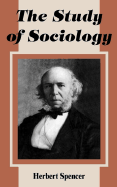About this title:
Herbert Spencer (1820-1903) was regarded by the Victorians
as the foremost philosopher of the age. The prophet of
evolution at a time when the idea had gripped popular
imagination, he made important contributions to biology,
psychology, sociology and philosophy. This selection
provides a cross-section of Spencer's work from his more
popular and approachable essays and volumes as well as
volumes of the Synthetic Philosophy itself.
Education:
intellectual, moral, and physical

Data of ethics

About this title:
Conduct in general; The evolution of conduct; Good and bad
conduct; ways of judging conduct; the physical view; the
biological view; the psychological view; the sociological
view; criticisms and explanations; the relativity of pains
and pleasures; egoism versus altruism; altruism versus
egoism; trial and compromise; conciliation; absolute ethics
and relative ethics; the scope of ethics.
Principles of
sociology.

About this title:
Herbert Spencer (1820-1903) was an English philosopher, best
known for his scientific writings. Together with Charles
Darwin and Thomas Huxley he was responsible for the
acceptance of the theory of evolution. His well-known essay
on Education: Intellectual, Moral and Physical was
considered one of the most useful and profound books written
on education. He projected a vast 10-volume work, Synthetic
Philosophy, in which all phenomena are interpreted according
to the principle of evolutionary progress. Together with
Charles Darwin and Thomas Huxley he was responsible for the
acceptance of the theory of evolution. Although no longer
influential in biology, his extension of his theory of
evolution to psychology and sociology remains important. His
"Social Darwinism" was particularly influential on early
evolutionary economists such as Thorstein Veblen. As
subeditor of the Economist (1843-53), Spencer was an
influential exponent of laissez-faire. His early book Social
Statistics (1851) was strongly tinged with an
individualistic outlook.
The study of
sociology

About this title:
Herbert Spencer (1820-1903) was regarded by the Victorians
as the foremost philosopher of the age. The prophet of
evolution at a time when the idea had gripped popular
imagination, he made important contributions to biology,
psychology, sociology and philosophy. This selection
provides a cross-section of Spencer's work from his more
popular and approachable essays and volumes as well as
volumes of the Synthetic Philosophy itself.
The principles of
biology

The principles of
psychology

About this title:
Emphasizing concepts of adaptation, continuity, and
development, Spencer attempted to found psychology on
principles of evolutionary biology. In so doing he laid the
groundwork for scientific functionalism, developmentalism,
and the sensorimotor theory of cortical localization.
Facts and Comments

About this title:
Herbert Spencer (1820-1903) was an English philosopher, best
known for his scientific writings. Together with Charles
Darwin and Thomas Huxley he was responsible for the
acceptance of the theory of evolution. His well-known essay
on Education, Intellectual, Moral and Physical was
considered one of the most useful and profound books written
on education. "During the years spent in writing various
systematic works, there have from time to time arisen ideas
not fitted for incorporation in them. Many of these have
found places in articles published in reviews, and are now
collected together in the three volumes of my Essays. But
there remain a number which have not yet found expression;
some of them relatively trivial, some of more interest, and
some which I think are important. "I have felt reluctant to
let these pass unrecorded, and hence during the last two
years, at intervals now long and now short, have set them
down in the following pages. Possibly to a second edition I
shall make some small additions, but, be this as it may, the
volume herewith issued I can say with certainty will be my
last. "Herbert Spencer, March 1902